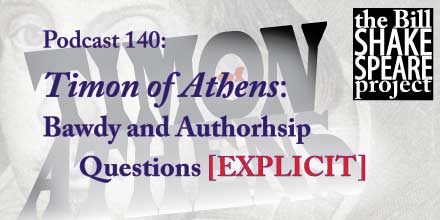OK, in Act Four of Timon of Athens, Timon ‘introduces’ himself to Alcibiades as “Misanthropos” (IV.iii.54). Interestingly, the words ‘misanthrope’ and ‘misanthropy’ didn’t exist in Shakespeare’s day (and no, he didn’t invent them). “Misanthropos” is Timon’s self-moniker (Timon Misanthropos) from Shakespeare’s source material in Plutarch (though the version I quoted earlier in our discussion on sources seems to have left it out), and I’m guessing that enough people were aware of this for Shakespeare to use the reference.
And I’ve seen some people paint Apemantus with a broad brush as an misanthrope as well. (Did I? Let me check. Yup, I was just as guilty in my Act One review… and then again and again… bad Bill, bad). But Apemantus is not a misanthrope. He’s a cynic (but maybe even more than that, a Cynic).
What’s the difference, you ask?
Continue reading “Dog-gone: of cynics and misanthropes”

